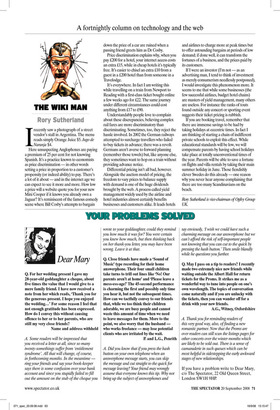A fortnightly column on technology and the web
Rory Sutherland
Irecently saw a photograph of a street vendor’s stall in Argentina. The menu reads simply Orange Juice $5. Jugo de Naranja $4.
Here unsuspecting Anglophones are paying a premium of 25 per cent for not knowing Spanish. It’s a practice known to economists as price discrimination — in other words setting a price in proportion to a customer’s propensity (or indeed ability) to pay. There’s a lot of it about — and in the internet age we can expect to see it more and more. How low a price will a website quote you for your new Mini Cooper if it knows you already own a Jaguar? It’s reminiscent of the famous comedy scene where Bill Cosby’s attempts to bargain down the price of a car are ruined when a passing friend greets him as Dr Cosby.
Price discrimination explains why, when you pay £200 for a hotel, your internet access costs an extra £15, while in cheap hotels it’s typically free. It’s easier to chisel an extra £10 from a guest in a £200 hotel than from someone in a Travelodge.
It’s everywhere. In fact I am writing this while travelling on a train from Newport to Reading with a first-class ticket bought online a few weeks ago for £22. The same journey under different circumstances could cost anything from £17 to £90.
Understandably people love to complain about these discrepancies, believing complex rail fares are more discriminatory than discriminating. Sometimes, too, they reject the hassle involved. In 2002 the German railways attempted to surcharge travellers who failed to buy tickets in advance; there was a revolt. Germans aren’t averse to forward planning (remember those towels) but, like anyone else, they sometimes want to hop on a train without providing advance notice.
Differential pricing isn’t all bad, however. Alongside the auction model of pricing, the freedom to vary prices to balance supply with demand is one of the huge dividends brought by the web. A process called yield management widely used by the airline and hotel industries almost certainly benefits businesses and customers alike. It leads hotels and airlines to charge more at peak times but to offer astounding bargains at periods of low demand; if done well, it can transform the fortunes of a business, and the prices paid by its customers.
If I were an investor (I’m not — as an advertising man, I tend to think of investment as merely consumerism needlessly postponed), I would investigate this phenomenon more. It seems to me that while some businesses (the few successful airlines, budget hotel chains) are masters of yield management, many others are useless. For instance the ranks of touts found outside any concert or sporting event suggests their ticket pricing is rubbish.
If you are booking travel, remember that there are immense savings to be had by taking holidays at eccentric times. In fact I am thinking of starting a chain of indifferent private schools to exploit this effect. While educational standards will be low, we will compensate parents by having school holidays take place at totally unconventional times of the year. Parents will be able to save a fortune on flights and villa rentals by taking their main summer holiday in June. Those fiendishly clever Swedes do this already — one reason why you never hear anyone complaining that there are too many Scandinavians on the beach.










































































 Previous page
Previous page